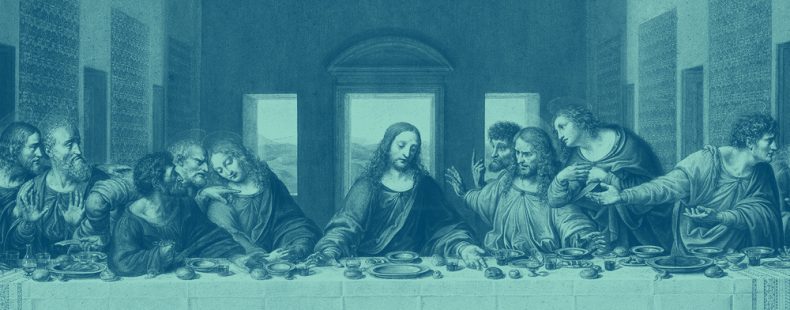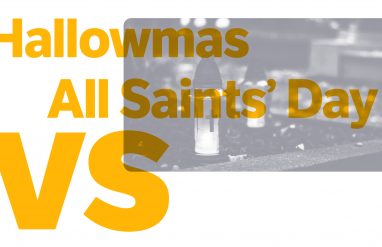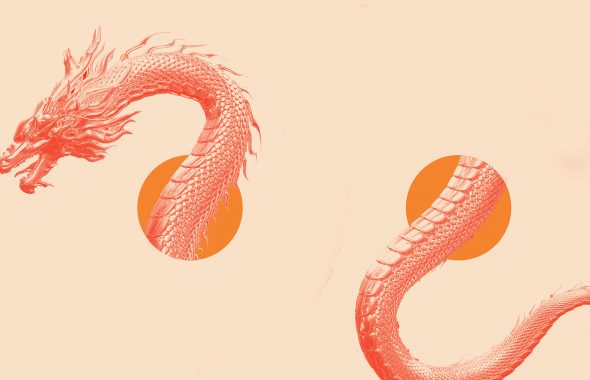No, Maundy Thursday is not a typo for Monday Thursday.
Maundy Thursday—also known as Holy Thursday and Sheer Thursday, among other names—is a Christian holy day that commemorates events known as the Washing of the Feet and the Last Supper.
This day is part of the Holy Week leading up to Easter. Maundy Thursday comes after Holy Wednesday, and is followed immediately by Good Friday, Holy Saturday, and then Easter Sunday. These occasions, in Christianity, correspond to events that lead to the resurrection of Jesus Christ after his crucifixion.
What does maundy mean?
On its own, the word maundy means “the ceremony of washing the feet of the poor, especially commemorating Jesus’s washing of his disciples’ feet on Maundy Thursday.”
Recorded around 1250–1300, the word maundy comes from the Old French mande, in turn from the Latin mandātum, which means “mandate or command.” As you may have guessed, this Latin word is the source of the English mandate.
The specific mandate or command at hand refers to the words Jesus is believed to have spoken after washing the feet of his disciples during the Last Supper. In the New King James Version of the Gospel of John, chapter 13, verse 34, Jesus said: “A new commandment I give you, that you love one another; even as I have loved you, that you also love one another.” New commandment, in the Latin of the Vulgate, is novum mandātum.
What was Washing of the Feet?
During the Last Supper, Jesus washed the feet of his 12 disciples as they shared their final meal. The meaning of washing feet is layered: it’s said that in the ancient world, a host would offer water for guests to wash their feet (sandals being the footwear of the day). So, washing feet is a sign of hospitality—of welcoming and care.
It is also an act of humility, as it’s said servants often washed feet. The son of God, as Christians believe Jesus is, doing something so lowly? Christians have come to interpret Jesus’s washing of the feet as an illustration of a humble mission of service.
The act has also come to symbolize the cleansing of sin from his fellow Christians—and so Jesus’s new commandment was urging his disciples to show forgiveness to all.
Today, this act is frequently reenacted, among other occasions, during Maundy Thursday services, with priests washing the feet of their parishioners.
What was the Last Supper?
You have probably seen Leonardo da Vinci’s iconic painting of (and called) the Last Supper—and if not, you have probably seen the many references to it in popular culture, from Battlestar Galactica to The Da Vinci Code.
In the Gospels, the Last Supper is described as the final meal of Jesus Christ and his 12 disciples before his arrest and subsequent crucifixion.
It is called the Last Supper because it was the final (last) time they all gathered around a table together to a meal (supper) of wine and bread—which became the institution of the Eucharist, remembering how Jesus gave his body (symbolized as bread) and blood (wine) in a sacrifice for the salvation of humanity.
Dating the Bible—and dating the events in the Bible as historical events—is heavily debated. At least one biblical scholar, however, argues that Maundy Thursday took place on April 1, 33 CE. That was actually a Wednesday in today’s calendar!
How is Maundy Thursday celebrated?
Around the world, Christians commemorate and observe Maundy Thursday with a variety of customs in addition to going to church services.
The UK features something known as Maundy money, which is money distributed as alms (charitable givings) in conjunction with the ceremony of maundy or on Maundy Thursday. These alms themselves can be called, simply, maundy.
Historically in the UK, monarchs would wash the feet of the poor and give people food and clothing. Starting in 1662, Charles II would mint special coins given as alms. These days, the coins are given to elder members in the Church of England at a special service known as Royal Maundy. The value of these silver coins—which are legal tender but principally symbolic alms—is equal to the age of the monarch in pence.














